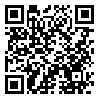BibTeX | RIS | EndNote | Medlars | ProCite | Reference Manager | RefWorks
Send citation to:
URL: http://journal.muq.ac.ir/article-1-731-en.html

 , Tahereh Dehdari *
, Tahereh Dehdari * 
 2, Sarallah Shojaei3
2, Sarallah Shojaei3 

 , Batool Sadat Hashemi4
, Batool Sadat Hashemi4 
 , Akbari Zahra5
, Akbari Zahra5 
 , Hava Daryafti5
, Hava Daryafti5 

2- 2Faculty of Health, Iran University of Medical Sciences, Tehran, Iran. ,
3- Nekoei Education & Treatment Center, Qom University of Medical Sciences, Qom, Iran.
4- 4Qom University of Medical Sciences, Qom, Iran.
5- Faculty of Health, Shahid Sadoughi University of Medical Sciences, Yazd, Iran
Background and Objectives: Exclusive breastfeeding is the most effective way of feeding infants until 6 months of age. The present study aimed to determine the beliefs of pregnant women in Qom city about exclusive breastfeeding until 6 months of age based on constructs of theory of planned behavior.
- : In this descriptive cross-sectional study, after designing a questionnaire to measure the constructs of theory of planned behavior, including behavioral, normative, and control beliefs, and also determining its validity and reliability, 240 pregnant women in Qom were selected using cluster sampling and completed the questionnaires. Data were analyzed using descriptive statistics.
Results: More emotional relationship with infants was the most important positive behavioral belief, and belief in breast malformation and fatigue was negative behavioral beliefs about exclusive breastfeeding among the pregnant women. The opinion of physicians and health care providers about exclusive breastfeeding was reported as the most important normative belief, and urging of relatives, especially mother or mother-in-law to use sweet water or powdered milk was the most important control beliefs among the mothers, which made exclusive breastfeeding difficult.
Conclusion: Promoting positive beliefs and correcting wrong beliefs about exclusive breastfeeding, along with consideration of the role of health care providers and husband would help pregnant mothers to accept the choice of exclusive breastfeeding until the end of 6 months of age.
Received: 2016/04/17 | Accepted: 2016/04/17 | Published: 2016/04/17
| Rights and permissions | |
 |
This work is licensed under a Creative Commons Attribution-NonCommercial 4.0 International License. |





